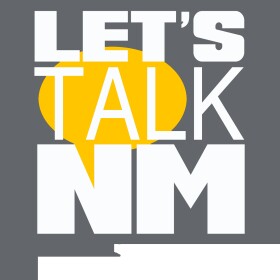
Let's Talk New Mexico
Let's Talk New Mexico, Thursdays at 8a
We discuss a wide range of topics and stories on the show. News reporters explore their beats in greater detail during the hour-long show and listeners have the opportunity to weigh in, share their experiences and ask questions of our panelists. We cover culture, history, policy, government, the environment, education, lawmaking, criminal justice, public health, inequality and solutions to the problems we experience in our communities.
Listeners can:
- call 505-277-5866 to participate live during the show
- email LetsTalk@kunm.org
- comment on our Facebook page
- follow us on Instagram @kunmnews
Find our podcast on Apple Podcasts and Spotify.
Questions? Comments? Email the KUNM News Director.
-
This week on Let’s Talk New Mexico, we’ll be discussing the bill going through the Roundhouse trying to reform New Mexico's medical malpractice system and what supporters are saying will help recruit and retain health care workers, while opponents push back.
-
This week on Let’s Talk New Mexico, we’ll be taking a look at threats to transgender rights in New Mexico, and we’ll be talking to the folks who are doing their best make sure New Mexicans get the care they need.
-
This week on Let’s Talk New Mexico, we’re diving into the design philosophies that will hopefully make our streets safer for everyone: drivers, cyclists and pedestrians alike.
-
New Mexico’s 112 legislators and their staffs plus more than 400 more aides, pages and security personnel at the Roundhouse, and the countless advocates and lobbyists, are all flooding into Santa Fe for the session. So where do they stay? And where do they eat? And what about entertainment? On the next Let’s Talk New Mexico we’ll discuss the session’s effects on the city.
-
Geothermal energy is a virtually inexhaustible and clean renewable resource that can be used for heating, cooling, and electricity generation by tapping into steam and hot water created by the Earth’s molten core. A recent report found that New Mexico has the potential to produce substantial power from its abundant geothermal resources – but what will it take it to tap into it?
-
There’s been talk of investing in the state fairgrounds for decades, but this time millions are being spent to support planning and community engagement, and some options have gone public. So, how will it affect the surrounding neighborhoods, and, is there a plan to make sure gentrification doesn’t displace folks? What do you expect from a redeveloped fairgrounds in the coming years?
-
’Tis the season for holiday parties and time with friends and family, but it’s also one of the busiest times of year for emergency room visits. As we head into the end of the year, hospitals and first responders see a surge in injuries.
-
We’ve heard from unhoused folks that having a pet gave them a reason to survive when they otherwise may have given up. But when people are having trouble taking care of themselves, is it fair for their animal companions to also suffer?
-
Maybe the most overlooked part of going anywhere in a car is parking once you’re there. We assume there will be a spot for our car, either at a business, or on a street, or in a garage. But should we expect parking? How much should it cost us and how much does it cost to provide? And should we presume it will be safe for us and our property?
-
This week on Let’s Talk New Mexico we’re discussing all things food insecurity in New Mexico, including the overarching causes and necessary changes.










